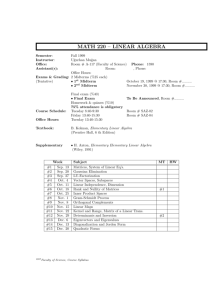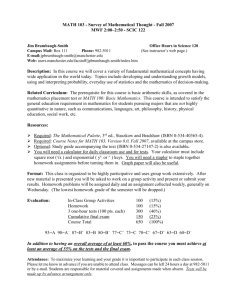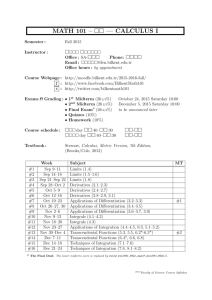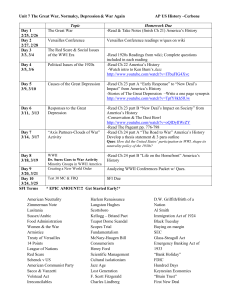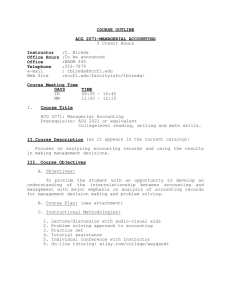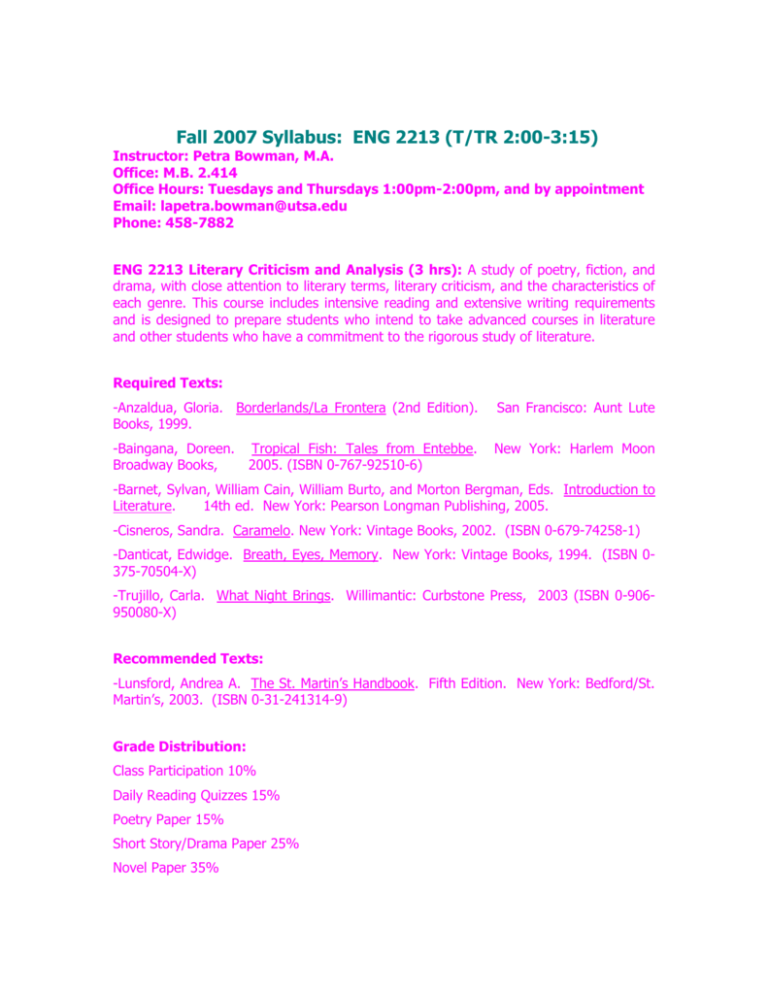
Fall 2007 Syllabus: ENG 2213 (T/TR 2:00-3:15)
Instructor: Petra Bowman, M.A.
Office: M.B. 2.414
Office Hours: Tuesdays and Thursdays 1:00pm-2:00pm, and by appointment
Email: lapetra.bowman@utsa.edu
Phone: 458-7882
ENG 2213 Literary Criticism and Analysis (3 hrs): A study of poetry, fiction, and
drama, with close attention to literary terms, literary criticism, and the characteristics of
each genre. This course includes intensive reading and extensive writing requirements
and is designed to prepare students who intend to take advanced courses in literature
and other students who have a commitment to the rigorous study of literature.
Required Texts:
-Anzaldua, Gloria. Borderlands/La Frontera (2nd Edition).
Books, 1999.
San Francisco: Aunt Lute
-Baingana, Doreen. Tropical Fish: Tales from Entebbe.
Broadway Books,
2005. (ISBN 0-767-92510-6)
New York: Harlem Moon
-Barnet, Sylvan, William Cain, William Burto, and Morton Bergman, Eds. Introduction to
Literature.
14th ed. New York: Pearson Longman Publishing, 2005.
-Cisneros, Sandra. Caramelo. New York: Vintage Books, 2002. (ISBN 0-679-74258-1)
-Danticat, Edwidge. Breath, Eyes, Memory. New York: Vintage Books, 1994. (ISBN 0375-70504-X)
-Trujillo, Carla. What Night Brings. Willimantic: Curbstone Press, 2003 (ISBN 0-906950080-X)
Recommended Texts:
-Lunsford, Andrea A. The St. Martin’s Handbook. Fifth Edition. New York: Bedford/St.
Martin’s, 2003. (ISBN 0-31-241314-9)
Grade Distribution:
Class Participation 10%
Daily Reading Quizzes 15%
Poetry Paper 15%
Short Story/Drama Paper 25%
Novel Paper 35%
Course Policies:
-All readings are due on the date specified in the course schedule and are to be done in
preparation for class.
-Daily quizzes will be given at the start of every class period to assess whether you have
read the material; all quizzes will be comprised of 10 questions. The quizzes will cover
the material assigned for that day. Students who are late for class will not have the
opportunity to ‘make-up’ the quizzes. Students with excused absences (see below) will
not be penalized for the missed quizzes.
-You are encouraged to ask questions, draw conclusions, and make inter-textual
connections between
the texts we read and discuss. You are also encouraged to engage in conversation with
your classmates.
If you disagree about your classmates opinion, feel free to
respectfully say so and to substantiate your claims.
-Papers are due at the beginning of class on the date announced on the syllabus.
Papers one day late will lose one letter grade. Papers two days late will lose two letter
grades. Papers more than two days late will not be accepted and will receive a grade of
‘F’ (N.B. “one day late” does not equal “one class period late”).
-Papers are to be typed, double spaced, written in MLA style (Modern Language
Association) (see St. Martin’s Handbook). Use 12 pt font. Include the following
information at the top left of the first page of all of your papers: Name, Banner ID,
Course Number, Instructor, and Date (see sample sheet). All papers should include a
Works Cited page.
-Papers are scored according to the policy stated in the student handbook.
-My office hours are set aside specifically so that I may help you. During the semester,
I encourage you to use my office hours to your advantage. If you are having difficulty
understanding something we may have covered in class, or if you simply wish to discuss
possible paper ideas, feel free to stop by my office, call me during my office hours, or
email me.
-If you have a documented learning disability, please be sure to: 1) register with the
Disability Office (located 2nd floor of M.S. building) and 2) to meet with me so that we
may discuss ways in which you and I may work best to ensure your continued scholastic
success.
-There is no final exam in this course
Attendance:
Attendance is required. You will be allowed a maximum of two “unexcused”
absences and a maximum of two excused absences for which you will not be
penalized (N.B. only students with excused absences are not penalized for missed
quizzes). An absence will be considered an “excused absence” in the following cases: 1)
a doctor’s appointment, in which case you must inform me ahead of time (in person, by
phone, or by email) and provide me (on the day of your return to class) with official
documentation signed by your physician/clinic, and/or 2) an approved UTSA activity, in
which case you must also inform me ahead of time and provide me (prior to your
absence) with official documentation signed by a UTSA sponsor. For every absence
thereafter, two (2) points will be deducted from your final grade. Furthermore, whether
an absence is excused or not, you are fully responsible for all of the material presented
in class, including announcements about course procedures and/or syllabus changes.
(N.B. ultimately, in all cases, it is up to me to determine whether or not an absence is
properly and, therefore, acceptably documented.) (Please be sure to silence/turn off
your cell phones before class begins. See me if you plan on using a laptop during
class.)
Academic Honesty (from student Information Guide):
The integrity of a university degree depends on the integrity of the work done for that
degree by each student. The University expects a student to maintain a high standard
of individual honor in his/her scholastic work. “Scholastic dishonesty” includes, but is
not limited to, cheating on a test or other class work, plagiarism (the appropriation of
other’s work and/ideas in one’s own written work offered for credit), collusion (the
unauthorized collaboration with another person in preparing course work offered for
credit), taking an examination for another person, or any act designed to give unfair
advantage to a student, or the attempt to commit such acts. Academic dishonesty is a
violation of the Student Code of Conduct and is addressed in Appendix B, Sec. 203 of
the student Information Guide at www.utsa.edu. Should a student be accused of
scholastic dishonesty, a faculty member may initiate disciplinary proceedings. The
writing you do in all courses must be your own.
COURSE SCHEDULE
23 AUG
Literature
-Introduction to the Course and to the Study of Literary Criticism and
28 AUG
-Read Introduction to Literature, pages 3-25 and pages 1741-1809
30 AUG
-Read Introduction to Literature, pages 663-696
04 SEP
-Read Introduction to Literature, pages 697-718
06 SEP
-Read Introduction to Literature, pages 718-755
07 SEP
CENSUS DATE (5 p.m.): LAST DAY TO DROP OR WITHDRAW WITHOUT
A GRADE, OR
DROP AN INDIVIDUAL COURSE AND RECEIVE A 100%
REFUND (NO REFUNDS GIVEN
FOR DROPPING AN INDIVIDUAL
COURSE AFTER THIS DATE)
11 SEP
-Read Introduction to Literature, pages 756-787
13 SEP
-Read Introduction to Literature, pages 788-841
18 SEP
Paper #1 Due (Poetry Analysis)
-In-Class Peer Review I
20 SEP
-Read Introduction to Literature, pages 1025-1043 (includes Susan
Glaspell’s Trifles)
25 SEP
-Read Introduction to Literature, pages 1043-1093 (includes Tennessee
Williams’ The
Glass Menagerie)
27 SEP
-Read Introduction to Literature, pages 1475-1513(includes Henrik
Ibsen’s A Doll’s
House, Act I and II)
02 OCT
-Finish Introduction to Literature, pages 1513-1547 (includes Henrik
Ibsen’s A Doll’s
House Act III and Clare Boothe Luce’s Slam the
Door Softly)
04 OCT
-Read Introduction to Literature, pages 72-82, and 86-96 (includes Anton
Chekov’s
“Misery,” Alice Walker’s “Everyday Use,” and Margaret
Atwood’s “Happy Endings”)
09 OCT
-Read Introduction to Literature, pages 97-106, 144-147, and 157-165
(includes John
Updike’s “A&P” and John Steinbeck’s
“Chrysanthemums”)
11 OCT
-Read Introduction to Literature, pages 448-471 and 534-548 (includes
William Faulker’s
“A Rose for Emily,” Amy Tan’s “Two Kinds,” Helena Maria
Viramontes’ “The Moths”), and
Elizabeth Tallent’s “No One’s a Mystery”)
16 OCT
Paper #2 Due (Short Story/Drama Analysis)
-In-Class Peer Review II
18 OCT
-Gloria Anzaldua’s Borderlands/La Frontera (Section 1-3: “Atravesando
Fronteras /
Crossing Borders,” “ Movimientos de rebeldia y las culturas que
traicionan,” and
“Entering Into the Serpent”)
23 OCT
Coatlicue/ The
-Gloria Anzaldua’s Borderlands/La Frontera (Section 4-7: “La herencia de
Coatlicue State,” “How to Tame a Wild Tongue,” “Ttilli, Tlapalli / The Path
of the Red and
Black Ink,” and “La conciencia de la mestiza / Towards a New
Consciousness”)
23 OCT
LAST DAY TO DROP AN INDIVIDUAL COURSE OR WITHDRAW FROM ALL
CLASSES AND
RECEIVE AN AUTOMATIC ‘W’
25 OCT
-Carla Trujillo’s What Night Brings, pages 1-123
30 OCT
-Carla Trujillo’s What Night Brings, pages 123-242
01 NOV
-Sandra Cisneros’ Caramelo, pages 1-110
06 NOV
-Sandra Cisneros’ Caramelo, pages 111-221
08 NOV
-Sandra Cisneros’ Caramelo, pages 222-323
13 NOV
-Sandra Cisneros’ Caramelo, pages 324-439
15 NOV
-Edwidge Danticat’s Breath, Eyes, Memory (Chapters 1-12)
20 NOV
Afterword)
-Edwidge Danticat’s Breath, Eyes, Memory (Chapters 13-35, and
22 NOV
***NO CLASS: THANKSGIVING HOLIDAY***
27 NOV
-Doreen Baingana’s Tropical Fish: Tales from Entebbe, pages 1-96
29 NOV
-Doreen Baingana’s Tropical Fish: Tales from Entebbe, pages 97-177
-End of semester review and closing remarks
04 DEC
***NO CLASS: STUDENT STUDY DAY***
06 DEC
Paper #3 Due (Novel Analysis): Submit your papers to me
between
the hours of 10:30 am to 1:00 pm in my
office (M.B. 2.414). Absolutely no
papers will be accepted after 1:00 pm on this day.



